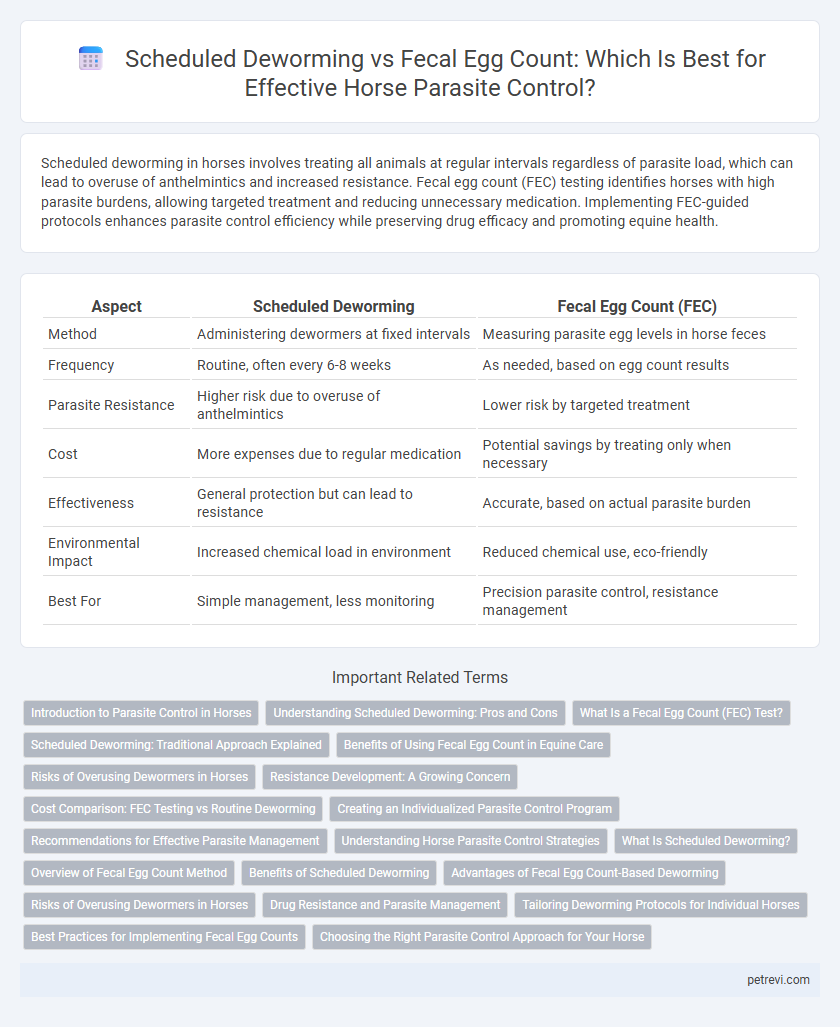Scheduled deworming in horses involves treating all animals at regular intervals regardless of parasite load, which can lead to overuse of anthelmintics and increased resistance. Fecal egg count (FEC) testing identifies horses with high parasite burdens, allowing targeted treatment and reducing unnecessary medication. Implementing FEC-guided protocols enhances parasite control efficiency while preserving drug efficacy and promoting equine health.
Table of Comparison
| Aspect | Scheduled Deworming | Fecal Egg Count (FEC) |
|---|---|---|
| Method | Administering dewormers at fixed intervals | Measuring parasite egg levels in horse feces |
| Frequency | Routine, often every 6-8 weeks | As needed, based on egg count results |
| Parasite Resistance | Higher risk due to overuse of anthelmintics | Lower risk by targeted treatment |
| Cost | More expenses due to regular medication | Potential savings by treating only when necessary |
| Effectiveness | General protection but can lead to resistance | Accurate, based on actual parasite burden |
| Environmental Impact | Increased chemical load in environment | Reduced chemical use, eco-friendly |
| Best For | Simple management, less monitoring | Precision parasite control, resistance management |
Introduction to Parasite Control in Horses
Effective parasite control in horses hinges on understanding the biology and life cycles of common equine parasites, such as Strongyles, Ascarids, and Bots. Scheduled deworming involves administering anthelmintics at regular intervals regardless of infection levels, aiming to reduce parasite burden broadly. Fecal Egg Count (FEC) allows targeted treatment by quantifying parasite eggs in feces, helping to identify high shedders and minimizing anthelmintic resistance.
Understanding Scheduled Deworming: Pros and Cons
Scheduled deworming involves administering anthelmintic treatments at regular intervals, typically every 6 to 8 weeks, to prevent parasite infestations in horses. This approach offers consistent parasite control but may contribute to the development of anthelmintic resistance due to frequent, indiscriminate use of dewormers. Despite its simplicity and ease of implementation, scheduled deworming lacks the targeted precision of fecal egg count-guided treatments, which can lead to unnecessary medication and increased costs.
What Is a Fecal Egg Count (FEC) Test?
A Fecal Egg Count (FEC) test measures the number of parasite eggs per gram of horse manure, providing precise information on the parasite load. This targeted diagnostic tool helps determine the necessity and timing of deworming, reducing the risk of drug resistance. Regular FEC testing enables horse owners to implement effective, data-driven parasite control programs tailored to individual needs.
Scheduled Deworming: Traditional Approach Explained
Scheduled deworming follows a fixed timetable, typically treating horses every 6-8 weeks regardless of parasite load, which simplifies parasite control but risks overuse of anthelmintics. This traditional method targets common parasites like strongyles and bots but may contribute to drug resistance if used indiscriminately. Consistent treatments without fecal egg count guidance can lead to unnecessary medication and reduced long-term efficacy in managing equine parasites.
Benefits of Using Fecal Egg Count in Equine Care
Fecal Egg Count (FEC) testing in equine care enables precise identification of parasite burdens, allowing targeted deworming treatments and reducing the risk of anthelmintic resistance. This method optimizes horse health by preventing unnecessary dewormer use and promoting sustainable parasite control. Incorporating regular FEC monitoring enhances overall horse performance and wellbeing by maintaining balanced parasite management.
Risks of Overusing Dewormers in Horses
Overusing dewormers in horses can lead to the development of anthelmintic resistance, reducing the effectiveness of treatments against strongyles and bots. Frequent, scheduled deworming without fecal egg count (FEC) monitoring may disrupt the balance of vulnerable parasite populations, promoting survival of resistant strains. Integrating FEC results allows targeted treatment, minimizing resistance risks and preserving equine health.
Resistance Development: A Growing Concern
Scheduled deworming in horses has accelerated resistance development in parasite populations due to frequent and indiscriminate use of anthelmintics. Fecal egg count-guided treatments reduce selection pressure by targeting only horses with significant parasite loads, thereby preserving drug efficacy. Monitoring fecal egg counts enables sustainable parasite control by minimizing the emergence of resistant worms like cyathostomins and strongyles.
Cost Comparison: FEC Testing vs Routine Deworming
Scheduled deworming often incurs higher drug expenses and risks resistance, while fecal egg count (FEC) testing involves upfront costs for lab analysis but reduces unnecessary treatments. Studies show FEC-guided parasite control lowers overall spending by targeting only horses with significant egg loads, optimizing anthelmintic use. Cost effectiveness improves over time as FEC testing prevents overuse of dewormers, making it a sustainable choice for equine parasite management.
Creating an Individualized Parasite Control Program
Scheduled deworming involves administering parasite treatments at fixed intervals, while fecal egg count (FEC) based deworming targets treatments only when parasite egg levels exceed a threshold, reducing the risk of resistance. Creating an individualized parasite control program for horses relies on regular FEC testing to assess parasite burdens and tailor treatment frequency and dewormer types accordingly. Incorporating pasture management and selective deworming based on FEC results optimizes horse health and minimizes the development of drug-resistant parasites.
Recommendations for Effective Parasite Management
Scheduled deworming typically involves regular, routine administration of anthelmintics regardless of parasite load, which may contribute to drug resistance in equine parasites. Fecal Egg Count (FEC) testing offers targeted treatment by measuring egg output, allowing for deworming only when parasite burdens exceed specific thresholds, improving treatment efficacy and sustainability. Effective parasite management combines strategic FEC monitoring, rotational use of anthelmintic classes, and maintaining pasture hygiene to reduce environmental contamination and minimize parasite reinfection in horses.
Scheduled Deworming vs Fecal Egg Count for Horse Parasite Control Infographic

 petrevi.com
petrevi.com